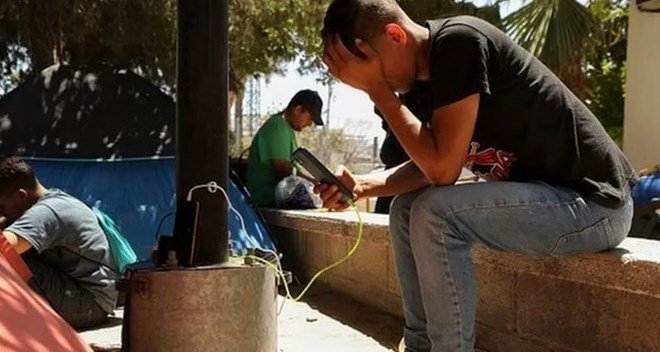
Sunday July 9, 2023

Getty Images
Washington DC (HOL) - Social media platforms, including TikTok, YouTube, and WhatsApp, have become vehicles for promoting fraudulent immigration services, according to experts. The phenomenon capitalizes on the ambiguity surrounding changes to U.S. immigration policy, misleading hopeful immigrants and profiting from organized crime syndicates.
Ed Calderon, a former Mexican police officer specializing in organized crime, states, "This is human trafficking," referring to the hundreds of videos promising affordable, safe passage to the U.S. Despite their innocuous appearance, these clips often hide the grim reality of a multibillion-dollar criminal enterprise.
Under the new guidelines which require migrants heading to the United States to apply for asylum online through the government's CBP One app and arrange an appointment to meet with US officials, or to apply for asylum first in a nation they pass through on their way to the US border, the number of detained immigrants has dropped by 70% as more migrants enter the U.S. legally.
Those who do not go through that process and yet cross the border will be presumed ineligible for asylum.
The 70% figure, however, does not indicate a decline in the profits of criminal entities assisting migrants in illicit border crossings.
"The demand for smugglers is likely to rise, especially for those who want to enter the United States without being detected," says Adam Isacson, a migration and border specialist at the Washington office of a Latin American agency.
According to Isacson, tightening immigration policy could cause smuggling costs to skyrocket. Various videos circulating on social media, posing as testimonials from satisfied customers or showcasing smugglers guiding groups through rugged terrains, illustrate the vast array of services offered.
These videos reach potential migrants worldwide, with private WhatsApp messages promising more details regarding smuggling prices and procedures. Despite the clandestine nature of these operations, experts believe that social media creates a continuous sense of urgency among migrants.
Guadalupe Correa-Cabrera, an assistant professor at George Mason University, states, "Smuggling networks understand this and use misinformation to scare migrants into attempting the journey by any means possible."
Prices for smuggling services vary widely, often determined by what traffickers believe a family can afford. U.S. officials have warned that criminal groups may exploit unpaid immigrants or be held in secret locations until their debt is paid.
Despite ongoing efforts to combat such content, fraudulent posts continue to increase on TikTok. Although the platform has pledged not to tolerate human trafficking, new videos quickly replace those that are removed.
The Department of Homeland Security has launched a geo-targeted advertising campaign in Central and South America on social media platforms to combat misinformation. These ads direct immigrants to government-run programs clarifying U.S. immigration policies and warning of the dangers associated with illegal immigration.
Meanwhile, experts suggest that social media misinformation campaigns will likely continue as U.S. domestic politics and border issues evolve. With the 2024 presidential election looming, smugglers are capitalizing on the uncertainty to increase demand for their services.
With files from the BBC